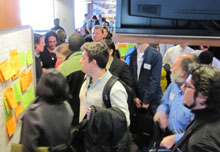Gov 2.0 brings together students, government, technologists

March 6, 2010 — The Gov 2.0 Camp New England went a long way toward proving that “spontaneous” and “organized” aren’t mutually exclusive terms.
Described as an “unconference,” the event brought together a wide range of participants, including government employees, contractors, and officials; students from the Harvard Kennedy School, MIT, Tufts, and beyond; academics and researchers; and citizens of every stripe. They came to share ideas about how social-media tools and other technologies can help make government more effective, efficient and inclusive. Gov 2.0 Camp New England was co-sponsored by the Shorenstein Center; Yasmin Fodil, a Harvard Kennedy School student, was co-chair of the event and the school’s Gov 2.0 group.
Helped along by the bright blue day outside, the atmosphere in the Harvard Kennedy School Forum resembled that of a summer camp. Universal participation was encouraged from the start: After a pointedly brief welcome, everyone in the room was asked to introduce themselves and say three words that encapsulated their interests.
The snippets included urban-planner geeky (“interoperable open cities”), civic idealism (“culture community accountability”), sincere pleas (“We need help,” said a local town’s representative), open access enthusiastic (“synergy, not silos”), as well as lighter sentiments — “need a job,” “time to graduate,” and “go Red Sox” all evoked laughter. In keeping with the Web 2.0 theme of the event, the sum of everyone’s three words were compiled in real time into a Wordle, which was sent out by Twitter with the event’s hash tag, #gov20ne.
As the coordinators promised, the event’s participants would make up the agenda as they went. All sessions would be conducted under “the rule of two feet”: If participants didn’t like the session in which they found themselves, they could try another, or even create a “splinter session” on the subject of their choice. A handful of speakers gave “lightning talks” on sessions not that they would present, but ones they hoped to participate in. (Speakers who went beyond the five-minute limit were reminded by a bell that their time was up.)
Laurel Ruma, from the camp’s organizing committee, started out by describing how Gov2.0 got its start. The first camp was organized by the Government 2.0 Club and took place last year in Washington, D.C. Last month Los Angeles hosted an event, and the next camp will be in Denver. In addition to Ruma and Fodil, the Gov 2.0 Camp New England organizing committee included Sarah Bourne, Jess Weiss and Rob Goodspeed.
Chris Dempsey of MassDOT then took his turn, describing how the department revised its data-access strategy by taking inspiration from the National Weather Service. “Why is it easy to get weather information, but impossible to know when the bus is coming?” Dempsey asked. Because weather data was freely available, but the MBTA’s wasn’t. Based on this insight, in November MassDOT made the strategic decision to release a real-time data feed for five bus lines; within an hour of the announcement, Corbett said, a Google Earth application had already been built by an independent developer. The department is now giving the open-access strategy “a push” with a contest for developers using the department’s data.
Dempsey was just one of the many from state and local government. Others included Brad Blake, director of new media and online strategy for Governor Deval Patrick; a representative of the Department of Fish and Game; two from state CTO’s Office; as well as city councilors and local representatives from across New England.
Proposed sessions included “Tweet Like a Pro,” “Where Is the Outreach?” (described as a “tale of things gone wrong”), “Getting to Yes,” and “Turbo-Vote: Connecting Voters Online.” Based on the proposals and the attendants’ interest (indicated by a show of hands), the grid of sessions was decided on the fly. It was a little bit like musical chairs — but with plenty of input from everyone concerned. Data-related ideas were grouped into one session, while new-media ideas got another; sessions were shifted and added, and the schedule filled up.
As the grid was being developed, Ruma followed the action on Twitter, responding when necessary. The breakouts wouldn’t be one-to-many discussions, she reassured the crowd after reading a Tweet. “It will be everyone participating.” Winning suggestions included “Transportation and Participation in a Democracy: What’s the Point?,” “Democratizing Data,” “Open Government and New Media,” and “Extreme Makeover: Citizen Edition.” The Gov 2.0 Camp New England wiki includes the full schedule as well as participants’ notes.
After all the sessions had come and gone, organizer Boris Jamet-Fournier expressed satisfaction. “I heard a lot of great ideas today,” he said, recalling one participant who observed that the central point wasn’t new technology like Twitter, but simply sharing data. “I thought it was a powerful way to insist that it’s really about adopting the mind set that will let you deliver the best service to the public.”
This article was written by and photos were taken by Leighton Walter Kille.